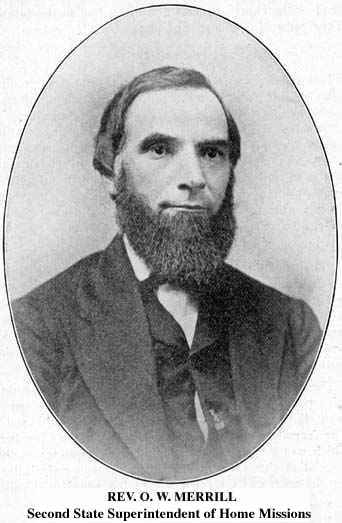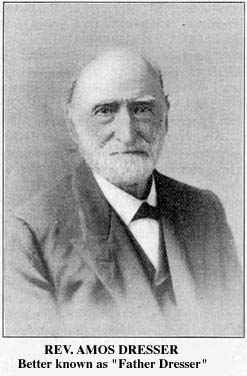
| 50 |
CONGREGATIONAL NEBRASKA
|
NEGenWeb Project
Resource Center
Church
The removal of the capital to Lincoln in 1868 (the enabling act was June 14, 1867) turned the tide of immigration to that part of the state, and Superintendent Gaylord, whose hard work began to tell upon his health, found the demands upon his strength were increasing with each year. The opportunity for establishing churches in southern Nebraska was increasing each year. The Union Pacific railroad was extending its line westward up the Platte valley, and settlers were following in its track. The Burlington railroad was planning to cross the state, thus making the new capital city easy of access, and in time a railroad, as well as political and educational center. Southern Nebraska in prophecy and in reality was calling loudly for missionaries and churches.
In Omaha and surrounding country the work was increasing rapidly. Mr. Gaylord in 1868 reports to the national society: "The past year has been one of constant and increasing activity in respect to all material interests. Our great railroad (the Union Pacific) is extending its iron arms toward the Pacific, and even now is reaching to embrace the mountains with their hidden treasures, which are soon to be laid at the feet of the nation. The population is increasing; capitalists are constructing railways; farms are brought under cultivation; towns and cities are springing up; and now is the time to lay the foundations of Gospel institutions for future generations. We must repeat here the experience and policy of the early settlers of New England, if we would see a prosperous and glorious future.
|
REMOVAL OF THE CAPITAL
|
47
|
Along the whole river front of this new and rapidly developing state your society has but two missionaries. We need a large reinforcement of laborers without delay. Situated as we are, in the very heart of the continent, on the great highway of nations, destined to become the chief source of supply to the mountain territories, how important it is that this valley should be thoroughly evangelized, not only for its own sake but for the regions beyond."1
If our National Society could only have sent the needed men and money into Nebraska at that time, and stood by the work through that period of foundation laying, our constituency would be vastly larger than it is to-day. Much was indeed done, but eastern men did not have the large vision of opportunity for church extension which the men on the frontier had, and when the vision did come other denominations had seized the opportunity. But our men on the field were active and the work was constantly growing. There is still a great opportunity in Nebraska. We need more men and money to develop our work.
April 6, 1896, Mr. Gaylord alludes to the coming resignation of Rev. I. E. Heaton, the second Congregational pastor in Nebraska, and says, "This church [Fremont] furnishes a beautiful illustration of the fruits of patient, persevering labor in planting and watering the institutions of the Gospel on new ground."2 The Fremont church is to-day one of the strong churches in the state and has been fortunate in the able men chosen for pastors. The list includes Rev. I. E. Heaton, Rev. J. B. Chase, Rev. Rosewell Foster, Rev. George Porter, Rev. Albert T. Swing, Rev. Loren F. Berry, Rev. William H. Buss, and the present pastor, Rev. John Doane.
Mr. Gaylord resigned the superintendency of home missions in Nebraska, March, 1870, and Rev. O. W. Merrill of Anamosa, Iowa, was appointed in his place. In his letter of resignation, Mr. Gaylord says: "As I now lay down my work, I look out upon a goodly family of churches, eighteen in number, the way to organize others preparing, and Gospel influences extending more rapidly than ever before. . . . There remaineth yet much land to be possessed, and in view of the present outlook of this frontier field, I earnestly hope that the resources of the society will enable it to enter and occupy the new openings for the Gospel that are constantly coming to our knowledge."1
As Mr. Merrill could not enter upon his work immediately, Mr. Gaylord continued to act for some time longer, and afterward took a trip to the Rocky mountain region in the interests of home missions. He later served the church at Fontanelle for a time, and finished his work in the state whose foundations for a great commonwealth he had helped to lay. He was a sturdy, active, wise, and consecrated man. Congregational Nebraska owes much to "Father Gaylord," his devoted wife, and their noble and heroic work in the state.
The State Association in its annual meeting 1870 passed the following resolution:
"That this association tender to Rev. R. Gaylord our gratitude for all the wisdom of counsel and effective aid he has rendered to the ministers and churches of our order

| 50 |
CONGREGATIONAL NEBRASKA
|
as agent of the A. H. M. Society, and we pray the Great Head of the church to bless and direct him in the future in the paths of usefulness and pleasantness."2
This same association of 1870 gave expression to the views of the churches on one of the most practical and helpful institutions of the church--the prayer-meeting:
'Resolved, That we deem the prayer-meeting of the highest importance to the Christian church; that we deem it very desirable to have all the members of the church take part in the meeting, be they old or young, male or female, and that all professing Christians should come from their closets to the meetings, and that they should have special subjects for prayer."3
It also declared:
"That the Pilgrim's idea and practice, religiously based and built upon the great doctrine of justification by faith, and governmentally upon the free, equal, and inalienable rights of all men before God and among themselves, deserve and should receive the warmest gratitude to God from all their natural and spiritual descendants, and the most earnest and whole-hearted extension."4
These expressions show the trend of thought in the formative period of our church life, and illustrate the sound evangelical position of Congregationalism in the state. The Narrative on the State of Religion in the Churches, which was a special feature of the early meetings of the association, shows that there had been precious revivals during the year, and several new churches added to the list.
|
REV. O. W. MERRILL, SUPERINTENDENT
|
51
|
There were then twenty-three Congregational churches in the state, In 1871 the association met for the first time in Lincoln, and Rev. Amos Dresser was chosen moderator.

"Father" Dresser was a man who threw his whole life into the home missionary work of the state. He was a veritable circuit-rider, worked largely in rural fields, was beloved by all the churches, and filled a large place in the work
| 52 |
CONGREGATIONAL NEBRASKA
|
of the state. Rev. A. F. Sherrill, D.D., writes of Father Dresser:5
"He was pretty near to pure stuff. I never rode with him over the prairies to his appointments without profit. He kept up his studies and thinking as long as I knew him. With a very tender and solicitous heart always for the people in his parish He used to own Butler county, as to religion."
At the time of the Lincoln meeting--1871--thirty-two churches were represented. Among these was Crete, destined to become allied with the Congregational educational center, and a church of commanding influence. There were then only two churches, Omaha and Fremont, that were self-supporting. The history of the churches is largely the history of home missions in the state. In his annual report Superintendent Merrill made a plea for the missionary spirit, and uttered these significant words
"We are laying the foundations of churches and of a work that is to be among and for millions, instead of thousands, and these foundations must not be laid in 'untempered mortar.' Permeating our work must be a Bible-instructed conscience, and outgrowing in our lives must he a deep sympathy with that redemption which Christ brought to our world. We can not afford to he narrow in our views of our duty, or to isolate ourselves from the great world-wide work of Christ through our great societies."6
Reviewing the work from the beginning Mr. Merrill alluded to the fact that forty men had labored in the state, nineteen of whom were then in active service, and five were still residing in the state but not in regular service. This year and the next were especially noted for the dis-
|
REV. O. W. MERRILL, SUPERINTENDENT
|
53
|
cussion and final action on the location of the Congregational college. The growth of Congregational churches in southeastern Nebraska was a large factor in that issue.
Before another year had rolled by we find Superintendent O. W. Merrill prostrated with sickness and unable to continue his work.
Rev. J. B. Chase assumed temporarily a part of the burden and made the report for 1873. From this report we take the following passage which shows the rapid development of the state
"There is at the present time much work that needs to be done by us to fill up the demand, made by the unparalleled immigration of the past year. The frontier has been crowded along toward the setting sun from fifty to one hundred miles. There are some counties which had scarcely a settler one year ago, that to-day are so fully occupied that there is scarcely a good homestead of government land that is not occupied. The counties north of the Platte need immediate visitation by the superintendent, and provision for spiritual necessity. South of the Platte, especially in what will be the garden of the state--the Republican valley--there are as many more."7
The work was growing.
This association also resolved that "God's work would be honored and advanced by the organization of a woman's board of missions," and appointed Mrs. J. E. Elliot, Mrs. A. Dresser, Mrs. A. B. Pratt, and Mrs. R. C. Birge a committee to "initiate the matter." Steps were taken to secure a "compact" with the Presbyterians to prevent friction in the development of home missionary work.